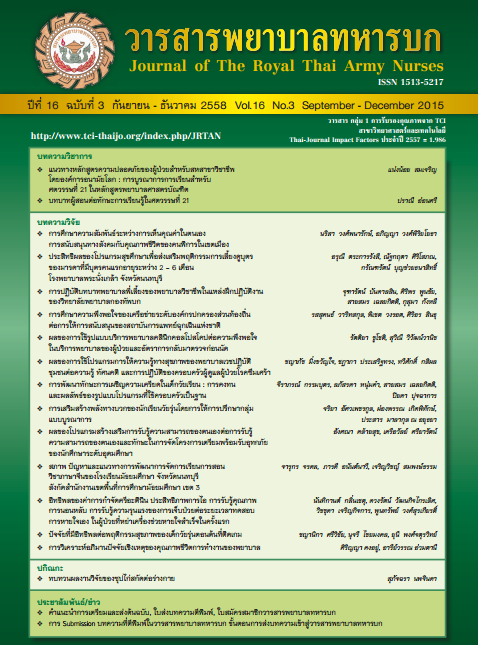การศึกษาความสัมพันธ์ระหว่างการเห็นคุณค่าในตนเอง การสนับสนุนทางสังคมกับคุณภาพชีวิตของคนพิการในเขตเมือง; Relationships Between Self-Esteem, Social Support, and Quality of Life Among Persons with Disabilities in Urban Area
Keywords:
การเห็นคุณค่าในตนเอง, การสนับสนุนทางสังคม, คุณภาพชีวิต, คนพิการ, Social support, Self-esteem, Quality of life, Persons with disabilitiesAbstract
การวิจัยครั้งนี้ มีวัตถุประสงค์เพื่อศึกษา 1) การรับรู้การเห็นคุณค่าในตนเอง การสนับสนุนทางสังคม และคุณภาพชีวิตและ 2) ความสัมพันธ์ระหว่างการเห็นคุณค่าในตนเอง การสนับสนุนทางสังคมกับคุณภาพชีวิตของคนพิการในเขตเมือง กลุ่มตัวอย่างจำนวน 80 คน ได้รับการคัดเลือกเข้าศึกษาด้วยวิธีการสุ่มอย่างง่าย เครื่องมือที่ใช้ในการวิจัยประกอบด้วย 1) แบบประเมินการเห็นคุณค่าในตนเอง 2) แบบสอบถามการสนับสนุนทางสังคม และ 3) แบบวัดคุณภาพชีวิต มีค่าความเชื่อมั่นเท่ากับ .76 .74 และ .81 ตามลำดับ วิเคราะห์ข้อมูลด้วยสถิติ การหาค่าความถี่ ร้อยละ ค่าเฉลี่ย ค่าเบี่ยงเบนมาตรฐาน และสถิติสหสัมพันธ์แบบเพียร์สัน ผลการวิจัย พบว่า กลุ่มตัวอย่างมีการรับรู้การเห็นคุณค่าในตนเอง การสนับสนุนทางสังคม และคุณภาพชีวิตอยู่ในระดับปานกลาง ( = 2.88, SD = .48,
= 2.55, SD = .80, และ
= 80.98, SD = 11.98 ตามลำดับ) และพบว่าการเห็นคุณค่าในตนเอง การสนับสนุนทางสังคม มีความสัมพันธ์ทางบวกกับคุณภาพชีวิตอย่างมีนัยสำคัญทางสถิติ (r = .46 และ r = .26 ตามลำดับ, ที่ระดับ .05) ข้อเสนอแนะจากผลการวิจัยครั้งนี้ ทีมสุขภาพควรพัฒนาโปรแกรมหรือกิจกรรมเพื่อส่งเสริมการเห็นคุณค่าในตนเองและการสนับสนุนทางสังคมให้กับคนพิการในชุมชนเพื่อเพิ่มคุณภาพชีวิตให้ดีขึ้น
The purposes of this study were to describe 1) the perceptions of self-esteem, social support, and quality of life and to explore 2) the relationships between perception of self-esteem, social support, and quality of life of persons with disabilities in urban area. The Simple random sampling was used to select 80 participants into the study. Research instruments included 1) the Self-Esteem Scale, 2) the Social Support Questionnaires, and 3) the WHOQOL-BREF-THAI. The reliabilities of these instruments were .76, .74, และ .81 respectively. Data were analyzed using frequency, percentage, mean, standard deviation, and Pearson product moment correlation. The results showed that the participants perceived self-esteem, social support, and the quality of life at a moderate level ( = 2.88, SD = .48,
= 2.55, SD = .80, และ
= 80.98, SD = 11.98 respectively). The perceptions of self-esteem and social support had a statistically significant positive correlations with quality of life (r = .46 and r = .26 respectively, p < .05). Results indicate that healthcare team should develop program or activities to promote self-esteem and provide social support for persons with disabilities to increase quality of life.
Downloads
How to Cite
Issue
Section
License
บทความหรือข้อคิดเห็นใดใดที่ปรากฏในวารสารพยาบาลทหารบกเป็นวรรณกรรมของผู้เขียน ซึ่งบรรณาธิการหรือสมาคมพยาบาลทหารบก ไม่จำเป็นต้องเห็นด้วย
บทความที่ได้รับการตีพิมพ์เป็นลิขสิทธิ์ของวารสารพยาบาลทหารบก
The ideas and opinions expressed in the Journal of The Royal Thai Army Nurses are those of the authors and not necessarily those
of the editor or Royal Thai Army Nurses Association.





